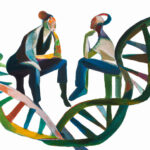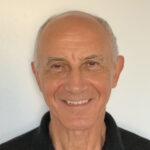
With Integrative Focusing, the goal of lasting change is not separate from how we work to achieve it. This is why this course is called The DNA of Change.
You practice ways to foster a mindful, proactive space in which clients will organically tap into their inner ability to heal and grow.
You develop a quality of presence that allows clients to face what might otherwise feel uncomfortable or even unbearable and allows new possibilities to emerge.
The DNA of Change is one of the 2 courses I teach to help you add a more embodied, experiential dimension to your work. The 2 courses complement each other, as each one explores the clinical skills of Integrative Focusing from a different perspective.
In each course, our time together includes:
– a process group that integrates personal experience with therapy,
– supervision, which we do in an interactive and creative way,
– discussion of the underlying theory. The theory itself is presented in video or writing that you study on your own before class, so that all our time together is experiential.
In addition to our sessions together as a group, you will be assigned to ongoing Focusing partnerships between sessions.
The course is suitable for all levels of Focusing experience, including therapists who have no prior knowledge of Focusing.
See below: | Curriculum | Homework & time commitment | The instructor | Dates | Cost | Registration |
Curriculum

The following curriculum refers to the lectures and Q&A related to Focusing. The process group on clinical experiences will be driven by what you and other students bring up in the group.
1. What are the goals of therapy?
Conceptual learning: The memory reconsolidation model. Other possible goals.
Clinical skills: Recognizing change when it happens.
2. Creating an ecosystem that allows Focusing (and change) to emerge organically
Conceptual learning: Focusing as the moment-by-moment process of integrating experience.
Clinical skills: Slowing down. Tracking self and client.
3. The pause, in Focusing and in Peter Levine’s somatic approach to trauma.
Conceptual learning: Revolutionary pause, need for safety & connection (Levine’s short video)
Clinical skills: Prioritizing safety and connection without turning that into avoidance.
4. A mindful take on positive psychology
Conceptual learning: The dynamic power of positive psychology and intentionally building resources.
Clinical skills: Focusing as a way of “owning” what is working in your life and what you want to achieve.
5. Mindful Change: Assisted self-discovery
Conceptual learning: Fostering creativity in the client’s process of self-discovery and change.
Clinical skills: How to facilitate the client’s process, bringing mindful attention to the dance of therapy to find openings for transformation.
6. Life-enhancing anxiety
Conceptual learning: We tend to avoid symptomatic anxiety. In doing so, we miss out on the depth of experience that comes from facing it.
Clinical skills: Developing our ability to stay present with our clients’ anxiety (and our own).
7. Defining moments for you as a therapist
Conceptual learning: Acknowledging past defining moments and making room for new ones in the future.
Clinical skills: How your past and future come into the present to make the session alive with possibilities.
Homework & time commitment

The live part of this course consists of 7 monthly online 2 1/2-hour sessions. There is a Q&A and experiential discussion of the lecture, supervision and process group. We may use demos, as well as creative forms such as role-playing a client’s situation, or rotating therapists within the same session with a “client.”
Before each session, you have a video and/or reading about the Focusing theme of the session (plan on 30 to 60 minutes of study per session for the required material, and more for optional material).
Between sessions, you have at least 2 study groups per month, where you practice the skills discussed at the previous session. You will be assigned to a small group in the first session of the course.
Of course, in this course as in all others, we pay utmost attention to fostering a sense of safety and connection.
This is a highly experiential course. You are not passively attending classes, you are learning by participating and being seen. It is expected that you will attend every session of the course. We understand that life can be unpredictable, and we allow for one missed session (which you must make up with class recordings).
You can take this course on its own or as one of the 4 courses of the Integrative Focusing Therapy training, leading to certification by the International Focusing Institute.
The instructor

Serge Prengel is a Focusing-oriented therapist. In addition to Focusing, he is also trained in Core Energetics and Somatic Experiencing.
Over the years, he has been exploring the similarities and differences between different approaches to better understand how change happens. He has conducted over 200 interviews with therapists, Focusers, researchers, and mindfulness practitioners.
See bio for Serge Prengel.
Dates

This course will next be offered in September 2024:
– Second Thursday of the month (9/12/24, 10/10/24, 11/14/24, 12/12/24, 1/9/25, 2/13/25, and 3/13/25)
– At a time convenient for people in many time zones (12 noon to 2:30 pm New York time).
Cost
The cost of this course is US $1,050 if you pay in 2 installments, or US $990 if you pay in full.
Note: no one will be turned away for lack of money. We will work with you to find a way to make this affordable.
Registration
Pre-register with the feedback form.